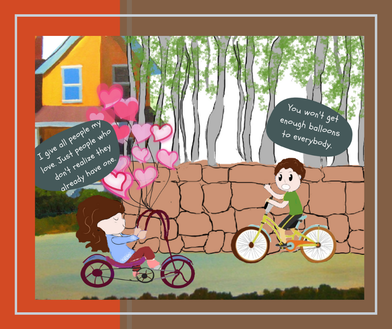Women Wellness Spring Blog |
|
There are three people in the meeting room for the business meeting. Samuel is watching the clock. It’s 7 pm, one hour of overtime already. He is late back home to catch up on the birthday dinner of his son. Sam: Ada, I’m sorry! I have to go now. Ada: Sam, you know what? Our business is going through a hard time. How’s your sales status for this month? Sam: I did push the customer to confirm the order. Ada: You’re not pushing hard enough. Close the sales is the point. You can guess Ada decides to fire Sam. Ada turns to the product design engineer. Ada: Peter, you worked on this project for nearly a year. When can we launch this product? Peter: There are plenty of technical issues not yet fixed. Ada: No more delay! We don’t need to make everything perfect before launching the product. I need the product ready in next month. Ada is an achiever (type 2 of enneagram). Recap the character trait and worldview of an achiever in part 1. How to get along with the achiever?
If you are the achieverYou deeply immerse yourself in performing the role to be the person you learn to be, with a clear roadmap about the task and what to achieve for self-assertion. Until one day, you realize the discrepancy between your visible swagger and invisible pain. You put enormous effort in your whole life to be a champion. The point is to win. However, our life is not supposed to operate in a way that it is whether you win or lose. How unlikely you will win all the time. If you love yourself, you don’t need to make your self-assertion through the achievement of magnificent projects. Learn to lose instead of how to win. Two years before, Tom was an executive director at a large corporation. He enjoyed every privilege of being a high-position executive, such as traveling by private jet, perfect hospitality arrangements, and people rushing to serve him a ceramic cup of coffee. One day, he no longer held this high position, the authority had gone, and all the privileges disappeared. Even if he wanted a cup of coffee, he could only self-serve a coffee with a paper cup. Power, authority, and position are not static without change forever. If you love your true self (instead of love the role), you will be grateful no matter if others serve you the coffee with a ceramic cup or a paper cup. You are well aware that: You are not a title on a name card; You are not merely a role. You are an authentic being, no matter win or lose. Think about learning to lose When you realize there is nothing to lose anymore, you are free. Get out of the emotional jail of self-deception. When you communicate with others, add more respect and empathy. Less Me, More Us. Treat people with kindness and empathy. Respect for others no matter who they are. Team up to help each other. Empower others to achieve more than they think they can do Vs. Power over the other to help you to achieve your task. Stay tuned to the next post about the romantic type (enneagram #4) #1. What causes better and worse relationships with others
#2 The killer strategies to handle difficult people #3 Creative way to level up communication Perfectionist (part 1 and 2) Giver (part 1 and 2) Achiever (part 1 and 2)
0 Comments
What is your perfect day all about?
My perfect day is included and not limited to: Sunshine, surrounded by natural wonders. Birds, flowers, green smell, Full English breakfast, walk a dog. Greeting with smiling faces, relax. Do the work I love, gossip with friends, laughing. Dinner with family, enjoy delicious food. Read a book, feel good with fulfillment. Have a good night's sleep. Today is a beautiful day! What does an achiever want to focus on others that provoke conflicts? How to release the communication tension? By using an enneagram as a tool, observing the finding from my experience with the real stories, that help me to come up with the insights that work for me to build great relationships with others. The Achiever (Enneagram / #3. The Achiever) The Character John is a sales manager, target-oriented, and he plays to win. Quality is not the point. He cares more about closing deals and meeting quota. David would complete all his homework on time, do all the studying, and perform very well in testing and examinations in school. He doesn’t need his mother or teacher to push him to study. He will figure out his schedule and determine to complete everything on schedule. Ada graduated from a famous university and climbed fast on the corporate ladder to become the director of a big company. She likes to dress smartly for work, is good at social skills, and knows how to catch the attention of the top management. The achiever is the shining star on the stage. They seek authority approval, enjoy the spotlight, and play to win. They combine the flavor of charming, practical, and supreme confidence. Worldview and the Drive They want to win. The drive is completing tasks and getting the work done. They want to be affirmed, to distinguish themselves from others, to have attention, and to be admired by others. There is that sense of playing their role as an inner worth through achievements. Positively speaking, they carry all the positive traits such as charming, ambitious, competent, and energetic that drive them to produce remarkable achievements. They are good at handling problems with positive ideas to speed up the work done. Communication Tension As they want to win, they tend to focus on removing the weak link. While you are running by the heel, they are running by the toes. They are working fast and impatiently. As winning is the point, they tend to appear selfish, practical, lacking compassion, empathy, or concern for others. Ada is an achiever who cares more about the company's benefit at the expense of the customer's benefits. Achieving the sales target is her task which supposes why she is here. She is an aggressive person to raise different conflicts with her colleagues. From her perspective point of view, other people are Not working hard enough Not fast enough Not smart enough Not good enough What will you feel if you work with her? Stay tuned to the upcoming part 2.
What does a giver want to focus on others that provoke disputes? How to release the communication tension? By using an enneagram as a tool, observing the finding from my experience with the real stories, that help me to come up with the insights that work for me to build great relationships with others. Let's recap the character traits and the story in part 1. How to get along with the giver? 1. Appreciate and praise their kindnessa) They need praise and compliments as much as you do. b) Your compliments need to be clear and specific. c) Praise for their kind intention instead of the actual work they had done. For instance, if your husband is a giver who helps you with the chores, you can praise him for his effort to share your burden rather than appreciate his cleaning work. 2. Need PermissionYou may feel the giver has disparaged your skill as if you can’t do it on your own. If so, say no to keep a healthy boundary by using the communication method of yes => no =>yes. Yes (appreciate the positive intention) No (tell your bottom line and speak nicely) Yes (make suggestion or promise). Recap the story: One day, Susan goes shopping and buys plenty of dresses and pants for the family. When Mandy (her daughter) returns home, she shows the dress that she buys for her. Mandy: OMG! The dress looks awful. You don’t know fashion. I like to buy the clothing by myself. Susan: I saw you wearing the same dress every day, never go shopping to buy new clothing. What I buy for you is the work of a well-known designer and is costly. You don’t appreciate your mom and are being so rude. OK, throw it away. Susan burst into tears. Mandy's response to her mom can be like this: (Yes) I’m so busy squeezing the time to buy my clothing, and you have bought one for me. Thank you, Mom! (No) However, I confess my taste is a bit ridiculous. That is the reason why I always wear the same dress. It's not easy to find an outfit that can match my taste and style. (Yes) I love shopping. Maybe next time we will go shopping together to buy the clothing. If you are a giver, No doubt you are kind and generous to care for others. At the same time, you are unaware you are playing the role of God, something like a mother loves her children at the expense of controlling them in every aspect of their life. You tend to believe that no one will know how to love others better than you do. Ever heard people say that: Your feeling becomes your thinking. Your thinking becomes your words. Your words become your action. Your actions become your result. And this will become your destiny. Once you change your perspective, you will change your feeling, thinking, and words. Change the perspective: humble vs. pride 1. Learn to be humbleThe givers are so generous. They are humble, aren’t they? Not really! They try to play the role of God in pride as if they know all the answers. Learning to be humble is avoiding being a rescuer by respecting others and yourself. Respect others Everyone is different and has the right to choose what they want, to realize that you would never know everything to decide for others. Being humble is to respect the choice of others because you will not know all the answers. Even if you want to help, please ask for permission. Respect yourself No one has the responsibility to care about you. In reality, most people are just thinking about themselves. If you care so much about whether others care for you, you will succumb to appeasing others. Remember that at the end of the day, almost nothing is belonged to you. Do your very best to make yourself happy. Be yourself. Respect yourself. 2. Healthy BoundariesWhat is a healthy boundary? When you find your friend is starving, you can ask him for dinner together. Your friend will feel cozy and warm via your caring attitude. And you don’t need to help him pay the home rent and buy him food daily. Supporter vs. Rescuer If you are a mom, you love your child. What will you do for your children: You do everything for the child by yourself (Mom A); or Allow the child to learn how to take responsibility for herself (Mom B). Mom A: The mom didn’t allow the child to wash dishes to prevent she broke the dishes up. The child never got a chance to participate in cooking because she feared the child would burn herself. When the child tried to wash his bag, her mom washed it for her as she worried the bag would not clean enough after washing. The child presumed that there was a lot of things she couldn’t handle by herself. Mom B: She taught her child how to wash the clothes to make it clean; How to wash the dishes to prevent breaking them; How to hold the hot food without burning herself. The child learned how to take responsibility for herself in her daily life. |
CatherineDigital marketer, writer, editor, feminine optimistic style, pursuit of happiness, addict to coffee. CategoriesArchives
February 2024
|
|
Privacy Policy
|
Disclaimer
The information contained in this website is for general information purposes only. We make no representations or warranties of any kind, express or implied, about the completeness, accuracy, reliability, suitability or availability with respect to the website or the information, products, services, or related graphics contained on the website for any purpose. Any reliance you place on such information is therefore strictly at your own risk.





 RSS Feed
RSS Feed